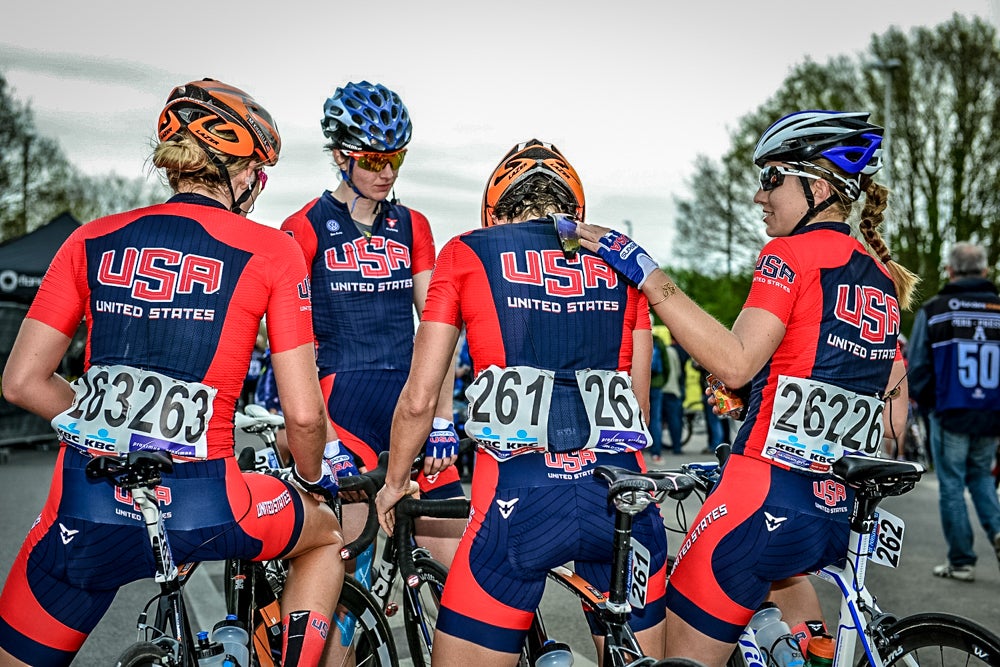Reporter’s notebook: Worlds selection spy novel

Photo: BrakeThrough Media | brakethroughmedia.com (File).
Monday evening, around 8 p.m. It’s the second night of the worlds in Richmond. I’m at dinner, some hip place with good lamb and even better pasta just two right turns from the finish line. A note pops up on my phone, unknown number. Just one word: “Komanski.”
What is this, a spy novel? No, this is cycling. Spies have nothing on us.
Almost a month ago, USA Cycling announced its world championship roster, seven women who would represent team USA on home soil. Lauren Komanski wasn’t on it. Allie Dragoo was.
Rumors of appeals for Dragoo’s start slot swirled in the leadup to worlds. She’s young, relatively inexperienced at the international level. Komanski wasn’t the only one who thought she deserved Dragoo’s slot — there were at least three others who considered appeals.
Fifteen minutes go by. Jim Miller, USA Cycling’s VP of athletics and the man responsible for building Team USA, stands up from a table at the back of the restaurant. Miller is slight, a former pro racer. We went to the same school in Fort Collins, Colorado. I’m sure he doesn’t know this. He wears sport coats or national team gear, I’ve rarely seen him in anything else. As he passes by our table, near the door, I can’t help myself — “Jim, is Komanski in?”
“I don’t know,” he says. His phone is out before the door closes behind him. Surprise on his face suggests he’s telling the truth. Or he’s surprised that I know.
Twelve hours after the text message, USA Cycling formally announced what that text message had intimated.
Following an arbitration process, the U.S. worlds team had a last-minute roster swap. Dragoo out, Komanski in. Two teammates, both on Twenty16-Sho-Air, swapped in the eleventh hour at a home-soil worlds. Questions poured in following the story on VeloNews: How does this happen? Why does this happen?
Allie Dragoo can blame Jimmy Carter, if she wants.
In 1978, President Carter signed the Ted Stevens Amateur Sports Act, which created the U.S. Olympic Committee and provided for national governing bodies under that committee, like USA Cycling. It also provided protection for individual athletes. That includes the right, laid out in Section 9, to the opportunity to participate in the Olympic, Pan American, or Paralympic games, as well as world championship events.
The law allows any individual athlete who feels he or she has not been provided with the opportunity to participate — hasn’t been adequately considered for a team slot — to file a formal, legal petition with the governing body.
Other countries don’t have such laws, and thus don’t have frequent appeals surrounding their selection process. The coach decides, and it’s done. Not so in the U.S.
Under the Ted Stevens act, an athlete must file a petition for a particular position. In this case, Komanski filed one against Dragoo. The case went to a single, independent arbitrator, an individual agreed upon by both parties.
An expedited, all-day hearing was held on September 21, last Monday, in Richmond. Using USA Cycling’s selection guidelines, the arbitrator decided that Komanski was more deserving of the slot. The full decision has not yet been released, so that’s all we know.
The arbitrator described the decision as “a close call,” and made it clear that he (I was able to confirm that he’s male) did not believe USA Cycling made its initial decision with any negligence or ill intent.
Komanski’s appeal was neither the first nor the last for USA Cycling. As recently as the Pan American games last summer, Kristin Armstrong was removed from the team after allegations that team selection criteria had not been published in a timely manner.
A short statement from Komanski’s legal counsel, Steve Thompson, landed in my inbox the morning after the decision was announced. It had one line I think is important: “This case was never about Ms. Komanski or Ms. Dragoo, but rather about the selection process itself.”
Komanski took quite a lot of flack on social media following the decision. This is unfortunate. USA Cycling’s selection process is far from perfect, its communication during that process is far from perfect, and all of this imperfection exists under the litigious umbrella of the Ted Stevens Act. Komanski was exercising her rights, and she should. It’s simply unfortunate that the entire process — it’s an important process — couldn’t have happened a few weeks earlier.
Don’t hate the player, hate the game. And don’t be surprised when Rio selection sees more spy-novel drama.